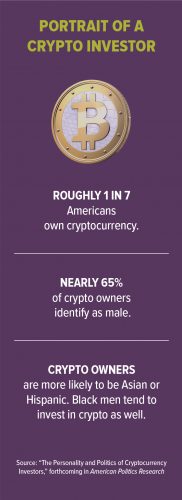Digital Gold Miners
Political scientist Grant Ferguson finds some surprises in researching the personalities and politics of cryptocurrency investors.

Grant Ferguson, an instructor of political science, found that those who invest in cryptocurrency are younger, as expected, but "we saw a huge range of different race and ethnicity identification." Photo by Leo Wesson
Digital Gold Miners
Political scientist Grant Ferguson finds some surprises in researching the personalities and politics of cryptocurrency investors.
AT A TIME IN THE NATIONAL CONSCIOUSNESS when practically every issue seems split along party lines, cryptocurrency has emerged as a unicorn: A certain type of investor, regardless of left/right leanings, has embraced crypto as a hedge against inflation.
“Broadly speaking, cryptocurrency has a lot of political science implications,” said Grant Ferguson, an instructor of political science at TCU.

Ferguson, who researches and teaches political psychology, and two other political scientists conducted groundbreaking research into who is buying cryptocurrency. The results might come as a surprise.
Ferguson said he expected the findings to support a stereotypical vision about cryptocurrency investors: a young Caucasian male “who was basically this libertarian single guy.” His work with colleagues provided a far more nuanced profile of the roughly 1 in 7 Americans who own crypto, per data from the Pew Research Center.
Based on the results of the nationally representative survey they conducted with 2,500 American adults in May 2022, the political scientists generated “the first robust profile of the personalities, demographics and political attitudes of cryptocurrency owners,” they write. Titled “The Personality and Politics of Cryptocurrency Investors,” the study is forthcoming in American Politics Research, a bimonthly journal.
Ferguson encouraged co-authors Kathryn Haglin, assistant professor of political science at the University of Minnesota Duluth, and Soren Jordan, an associate professor of political science at Auburn University, to include questions about crypto ownership on a joint survey that looked at universal basic income policies and other economic issues.
The three met while pursuing PhDs in political science at Texas A&M University.
Those buying crypto “tend to be younger, as we probably would have guessed, but we saw a huge range of different race and ethnicity identification, being stripped of a lot of things that are usually traditionally very divisive in politics,” Jordan said.
The average age of the 14 percent of those surveyed who reported that they own cryptocurrency was nearly 42 versus an average age of 49.7 for all those responding. Nearly 65 percent of those crypto owners identified as male.
As for race, the authors report that data indicated crypto owners “are significantly less white but are significantly more likely to be Asian and Hispanic.” Black men, they learned, gravitate toward cryptocurrency as well.
The political scientists also discovered that a higher percentage of crypto owners surveyed held college or graduate degrees than the sample average at 42 percent versus 33 percent.
The timing of the survey coincided with an 8.6 percent inflation rate, the highest in four decades in the U.S. While scrutinizing their data, Ferguson, Jordan and Haglin determined that hedging against inflation served as a huge draw for crypto investors.
“This suggests that when inflation is high, Americans could be more likely to use cryptocurrency as a medium of exchange and as a place to store value,” Ferguson said. He noted that in 2021 El Salvador became the first country in the world to adopt bitcoin as legal tender, one of the most significant indications of the prominence digital currencies could ultimately play in the world economy.

“When inflation is high, Americans could be more likely to use cryptocurrency as a medium of exchange and as a place to store value,”Grant Ferguson said. Photo by Leo Wesson
Bitcoin remains by far the most popular cryptocurrency since its debut in October 2008 as individuals and governments grappled with the Great Recession. Bitcoin’s anonymous creator said at its launch that the peer-to-peer digital currency would naturally resist inflation because it wasn’t tied to any government entity. Today the so-called digital gold has a market cap north of $500 billion. At its peak, a single bitcoin was worth more than $65,000 in November 2021 compared with $45,509 in January 2024.
“For me, the biggest surprise with our research was that I thought that maybe crypto owners would be less trusting of government or government spending,” Haglin said. “It turns out that most people are not particularly trusting of the government, so there wasn’t anything unusual about crypto owners in that sense.”
The study concluded that crypto owners are significantly more likely to be in favor of reducing government spending than non- crypto owners. Owning stock, meanwhile, was a strong predictor of someone’s decision to buy crypto in the first place.
Some 77 percent of the crypto owners surveyed said they owned traditional stocks. That’s in stark contrast to 42 percent of all the survey participants who reported owning stocks.
Ferguson plans to use this initial study as a foundation for research into how cryptocurrency shapes political discourse and elections.
“In the future, politicians might try and win voters by pitching policies that were favorable or unfavorable to cryptocurrency,” Ferguson said. “It will be interesting to see how politicians adapt at all levels to this political and economic tsunami.”

Your comments are welcome
1 Comment
Grant Ferguson’s research on cryptocurrency investors provides fascinating insights into the intersection of politics and economics. It’s intriguing to see how the crypto space has attracted a wide variety of individuals across different demographics, with race, education, and age all playing a role in shaping the typical investor. One of the most interesting takeaways is that crypto ownership doesn’t align with typical political stereotypes. It’s not just about distrust in government but about a broader inclination to diversify financial portfolios, particularly during times of inflation. This suggests that crypto could be more than just a fad—it may play a growing role in how Americans approach personal finance and political decision-making. As Ferguson notes, politicians may soon be crafting policies that cater to this emerging group, making cryptocurrency a significant factor in future elections. It will be exciting to see how this evolving landscape unfolds.
Related reading:
Research + Discovery
Banking on Growth
As Fort Worth continues to expand, Robert Sturns helps attract big business.
Research + Discovery
Rattling the Supply Chain
Tyson Browning studies the unintended consequences of punitive economic actions.
Research + Discovery
Lending Credibility
Stephen Lusch scrutinizes credit unions’ strategies to protect their regulatory advantage over banks.